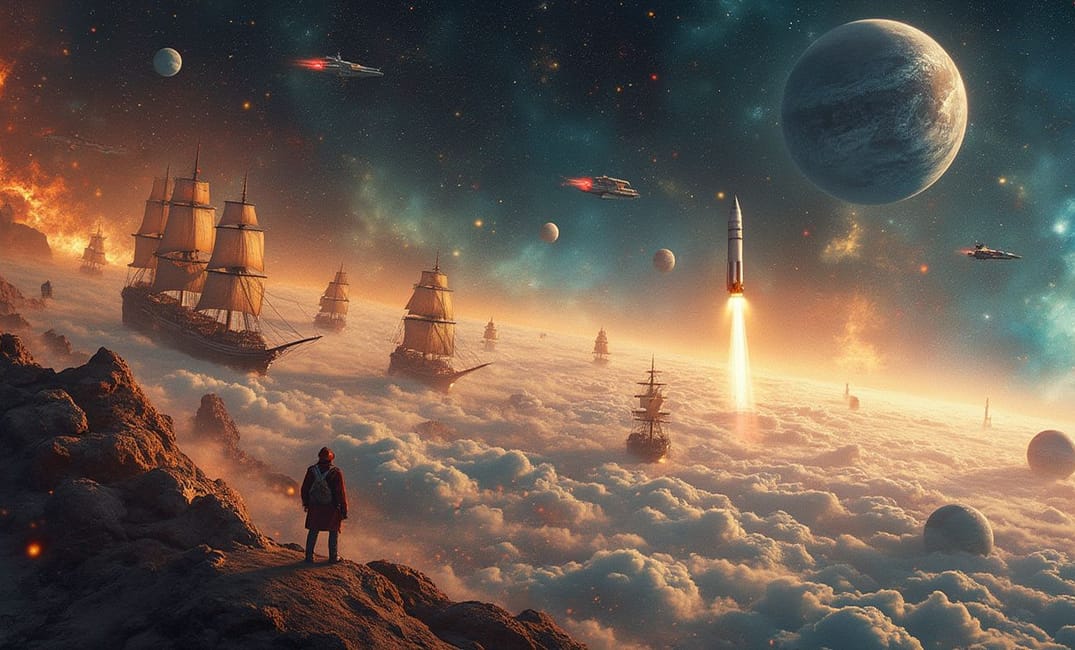Introduction: Charting the Uncharted
Human exploration is at the core of our collective identity—an insatiable curiosity drives us to chart the uncharted, seek out new frontiers, and understand the mysteries of our world and the universe beyond. From the earliest migrations to the latest space endeavors, exploration has defined human history, shaping cultures, economies, and technologies. Here, we explore the legacy of exploration, tracing its impact across time and its enduring promise for the future.
Ancient Explorations: Footsteps Across Continents
Early Human Migrations
- Out of Africa: Anthropological evidence suggests humanity's first major movement out of Africa occurred roughly 70,000 to 100,000 years ago, driven by climatic shifts and survival needs.
- Crossing Continents: Early humans traversed the Bering Land Bridge to the Americas and ventured into the Pacific Islands, driven by an intrinsic urge to explore beyond visible horizons.
Navigating the Known and Unknown
- The Dawn of Navigation: Mariners like the Polynesians mastered sea routes with innovative tools like the astrolabe, enabling trade routes that connected distant cultures.
- Exploration and Cultural Exchange: These journeys enriched societies through the exchange of goods, ideas, and technologies, affirming exploration as a conduit for global interaction.
The Age of Discovery: Expanding Horizons
European Exploration
- The Renaissance Spirit: Emerging from the Renaissance, the Age of Discovery (late 15th to early 17th century) saw explorers charting new territories, fueled by commerce and curiosity.
- Christopher Columbus and the New World: Columbus's voyages opened the Americas to European colonization, altering global landscapes dramatically, sparking debates on its impacts.
Consequences and Challenges
- The Columbian Exchange: This era exchanged organisms between worlds, diversifying agriculture but devastating indigenous populations due to illness and exploitation.
- Ethical Reflections: Colonial endeavors highlight the moral complexities of exploration, leading to reflections on our responsibility in new frontiers.
The Human Spirit in Science: Conquering the Elements
Scientific and Geographic Exploration
- Mapping the Globe: Explorers like Captain Cook and Lewis and Clark ventured into unknown lands, enriching Enlightenment-era scientific and cartographic knowledge.
- The Scientific Revolution: Explorations fueled scientific quests, inspiring theories like Darwin's evolution, transcending territorial gains for knowledge.
Polar Pioneers and the Quest for Extremes
- Arctic and Antarctic Expeditions: Explorers like Amundsen and Scott journeyed to poles, uncovering Earth's severe climates and prompting continued polar research.
- Modern Polar Research: Today, polar studies illuminate climate dynamics, underscoring exploration's relevance in addressing major scientific inquiries.
The Space Age: Reaching for the Stars
Launching into the Cosmos
- The Dawn of Space Exploration: Sputnik's 1957 launch initiated space exploration, catalyzing a Cold War-driven race that advanced rocket technology and solar system study.
- Apollo and the Moon Landing: The Apollo moon landings displayed human ingenuity, inspiring future celestial pursuits beyond Earth's orbit.
Beyond the Moon: New Frontiers
- Interplanetary Voyages: Mars Rovers and Voyager crafts unlock solar insights, studying planetary geologies and atmospheres.
- The International Space Station: The ISS represents global team efforts, housing advanced research shaping space-age endurance and cooperation.
Exploring Our Future: Mars and Beyond
Mars Exploration: Humanity's Next Frontier
- The Promise of Mars: Manned Mars missions aim to establish human presence on another planet, contemplating challenges like colonization and sustainability.
- Mars as a Reflection of Earth: Studying Mars helps unveil Earth's environmental histories and climate variations, enhancing understanding.
The Search for Extraterrestrial Life
- The Habitability Quest: Europa and Enceladus missions probe life conditions in their icy oceans, collaborating disciplines to answer humanity's perennial question of solitude in the universe.
- Astrobiology and Its Implications: Astrobiology enriches our understanding of life's potential scope, prompting philosophical and scientific ponderings of life's universality.
Conclusion: The Eternal Horizon
Human exploration embodies our quest for knowledge and boundary-pushing spirit. Through land, sea, sky, and space, explorers challenge norms and embrace the unknown, guided by curiosity and hope. At the dawn of new boundaries, from oceanic depths to cosmic frontiers, exploration's legacy celebrates imagination, resilience, and unity—a shared path to understanding our universe.
"The spirit of exploration is the enduring flame of humanity, lighting the way to realms unknown, where curiosity becomes the compass guiding us across eternity's vast and uncharted horizons." — *Author Unknown*
SCIENCE, TECHNOLOGY, SPACE TRAVEL, HISTORY, HUMAN EXPLORATION, CULTURE

